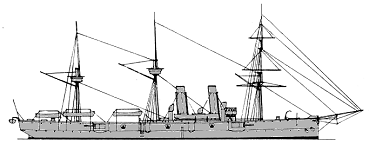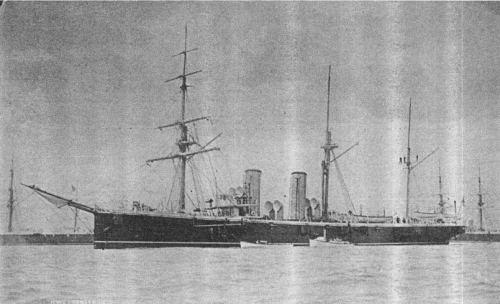

Leander 1897
| Name | No | Yard No | Builder | Laid down | Launched | Comp | Fate |
| Leander | 378 | Napier, Govan | 14.6.1880 | 28.10.1882 | 29.5.1885 | depot ship 1904 | |
| Arethusa | 379 | Napier, Govan | 14.6.1880 | 23.12.1882 | 29.9.1887 | sold to BU 4.1905 | |
| Phaeton | 380 | Napier, Govan | 14.6.1880 | 27.2.1883 | 20.4.1886 | TS 1909, sold 1913 | |
| Amphion | 207 | Pembroke DYd | 25.4.1881 | 13.10.1883 | 8.1886 | sold to BU 5.1906 |
|
Displacement normal, t |
4300 |
|
Displacement full, t |
|
|
Length, m |
91.4 pp 96.0 oa |
|
Breadth, m |
14.0 |
|
Draught, m |
6.25 |
|
No of shafts |
2 |
|
Machinery |
2 2-cyl HC, direct action, 12 cylindrical boilers |
|
Power, h. p. |
5500 |
|
Max speed, kts |
16.5 |
|
Fuel, t |
coal 1016 |
|
Endurance, nm(kts) |
11000(10) |
| Armour, mm | steel; deck: 38, gunshields: 38 |
|
Armament |
Leander, Phaeton: 10 x 1 - 152/26 BL Mk III, 10 x 4 - 25/40 Nordenfelt Mk I, 2 x 6 - 11.4/59, 4 x 5 - 11.4/60, 4 - 356 TC Arethusa: 10 x 1 - 152/26 BL Mk II, 10 x 4 - 25/40 Nordenfelt Mk I, 2 x 6 - 11.4/59, 4 x 5 - 11.4/60, 4 - 356 TC Amphion: 10x 1 - 152/26 BL Mk IV/VI, 10 x 4 - 25/40 Nordenfelt Mk I, 2 x 6 - 11.4/59, 4 x 5 - 11.4/60, 4 - 356 TC |
|
Complement |
278 |
Project history: Repeats of Mercury but
modified to include a protective deck and improved machinery and armament.
Originally classified as despatch vessels, they were redesignated second class
cruisers prior to completion. The arrangement of the hull and subdivision was as
in the previous class except that the lower deck over the length of the
machinery compartments (50.3m) was constructed of 38mm thick plating with sloped
sides to deflect shells entering at the water-line. The 152mm guns were mounted
on each side of the main deck with those furthest forward and aft fitted on
central pivot mounts and the remainder on broadside mounts. The end guns were
positioned in sponsons to provide ahead and astern fire and were protected by
38mm shields as defence against machine guns.
After trials with the Phaeton, the funnels were raised
by 1.8m to improve the draught to the boilers and subsequently all exceeded the
designed speed, averaging 17-18kts on trial. The improved economy of the TE
engine and an increase in the maximum coal stowage gave an endurance of 11000nm
at 10kis, a substantial improvement on the Mercury which had been
criticized in this respect. They were good steam vessels but poor sea boats with
a heavy roll in certain conditions of sea. They carried a barque rig identical
to that in Mercury and retained their yards until the late 1890s.
Ship protection: The lower deck over the length of the machinery compartments (50.3m) was constructed of 38mm thick plating with sloped sides to deflect shells entering at the water-line. Also 152mm guns had 38mm thick shields.
Modernizations: 1880s, Leander, Phaeton, Amphion: - 4 x 4 - 25/40; + 4 x 1 - 47/40 3pdr Hotchkiss Mk I
1880s, Arethusa: - 8 x 4 - 25/40; + 8 x 1 - 47/40 3pdr Hotchkiss Mk I
1890s, all: barque rig was replaced by military masts
Naval service: Phaeton was sold in 1913 and became TS Indefatigable; she was repurchased in 1941 and renamed Carrick II, serving as a Royal Navy TS throughout the Second World War.
Many thanks to Wolfgang Stöhr for additional information on this page.

Leander in her early days
© Ivan Gogin, 2014